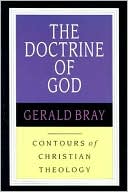

 |

|

The average rating for Doctrine of God based on 2 reviews is 3 stars.
Review # 1 was written on 2019-04-18 00:00:00 Taeryang Ha Taeryang HaWriting from a reformed, evangelical perspective, Bray makes his scholarship accessible to the diligent layman. The first volume in the Contours of Christian Theology series explores the knowledge, the nature and the trinitarian nature of God. Rather than being a systematic tome, this less than 300 page work explores the historical development of the doctrine of God. This approach reveals that much of what is Scripturally accurate about God has not always been articulated by the armchair theologian. Initially it was hammered out on the anvil of necessity. "Unlike modern heresies, which are conscious deviations from a received tradition, these ancient heresies [concerning the Trinity] were more like false trails pursued by people who wished to be orthodox, but who lacked the conceptual framework needed to express orthodoxy in the right way." Because the Trinity--and its implications--is fundamental to a correct understanding of God, it is to this subject that the author devotes the most pages. "The big difference between Christian faith and any kind of philosophical theology is that Christians claim to know God, the ultimate reality, personally." Knowing God is intimately tied up with grasping, at least experientially, the one God in three persons. But how do we describe the relationship between the Father, Son, and Holy Spirit? It took nearly four centuries for a suitable description to come unto its own. Augustine of Hippo is credited with influencing the standard form of trinitarian thought in the western tradition. Most Christians don't seem to ponder much on the triune nature of God--might even be intimidated by it. As a result, there is much latent unitarianism in "orthodox" circles. Augustine framed the Trinity in terms of love. Anselm posited that Christ's atoning work on the cross was a work of God within the Trinity. Karl Barth, in more modern times, contributed a Christological interpretation. Each angle has its strengths and weaknesses. But all are worthy contributors to the conversation. Bray does not shy away from Eastern Orthodox or Roman Catholic viewpoints. Where he feels they tally with Scripture, they are commended. But the author's goal is to formulate, albeit in short form, an "evangelical theology today." In the last chapter there is an insightful diversion into the concept of time. "The problem of time has occupied philosophers, artists, musicians and scientists, all in their different ways, and theologians have been only catching up with the general trend." There is also a reminder to preserve the Person: "That the Word became flesh and dwelt among us has always been one of the basic themes of the Christian gospel, but even today the implications of this stupendous fact are far from having been fully explored." Why a historio-theological survey of the Trinity? Perhaps that can best be answered by Bray himself: "We cannot neglect our past if we want to speak to the future." |
Review # 2 was written on 2014-06-16 00:00:00 Earl Nordstrom Earl NordstromBray does an excellent job expounding on the theological beliefs of the church. However, Bray's book takes a bizarre twist. Bray is incredibly hostile towards Thomas Aquinas and apologetics; to the point that Bray sides with skeptics which is an odd position for a theologian to take. After expounding that it is impossible for one to know that God exists, Bray then lays out the beliefs of the church. Bray, on page 205, even seems to discredit the belief in the human soul. It is not known whether Bray misunderstands the arguments made by Aquinas and apologists (which one would think to be unlikely), is ultra-critical of natural theology, or holds a hyper-presuppositional theology. Whatever the case, Bray gives too much credence to the skeptic and leaves one wondering whether he suffers from doubt. Bray takes the position that God's existence is too high for an individual to know completely. this is appreciated. but it is irresponsible to discredit all of natural theology when in fact the Bible itself proclaims that the "heavens declare the glory of God." In addition, this is an older book and many advances have been made in the apologetics arena since then. Regardless, read this book for knowledge in theology but do not approach this book with the anticipation that ones faith will be defended. |
CAN'T FIND WHAT YOU'RE LOOKING FOR? CLICK HERE!!!